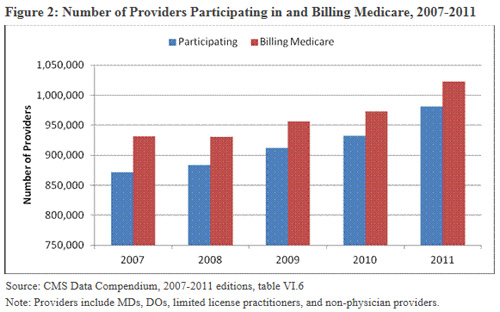Study Debunks Myth of Doctors Fleeing Medicare
The claim has become a staple of Republican efforts to undermine the Affordable Care Act and transform Medicare into a system in which future elderly receive vouchers to purchase health insurance in the private market. "We are starting to see physicians turn away from taking patients who are on Medicare," the GOP.gov web site warns, with "more and more physicians are choosing to opt out of Medicare altogether." In July, the Wall Street Journal dutifully picked up that cudgel, cheering one "doctor goes off the grid" while fretting "more doctors steer clear of Medicare."
Unfortunately, there's only one problem with the conservative claim that America's doctors are fleeing Medicare--and Medicare patients--in massive numbers. As a new study from the Department from Health and Human Services reveals, it's simply not true.
The New York Times explained why the new analysis should "demolish" the prevailing mythology about vanishing Medicare doctors once and for all:
The analysts looked at seven years of federal survey data and found that doctors are not fleeing Medicare in droves; in fact, the percentage of doctors accepting new Medicare patients actually rose to 90.7 percent in 2012 from 87.9 percent in 2005. They are not shunning Medicare patients for better-paying private patients, either; the percentage of doctors accepting new Medicare patients in recent years was slightly higher than the percentage accepting new privately insured patients.
Medicare patients had comparable or better access to medical services than the access reported by privately insured individuals ages 50 to 64, who are just below the age for Medicare eligibility. Surveys sponsored by the Medicare Payment Advisory Commission, an independent agency that advises Congress, found that 77 percent of the Medicare patients -- compared with only 72 percent of privately insured patients -- said they never had an unreasonably long wait for a routine doctor's appointment last year.
As USA Today detailed, the growing population of Medicare beneficiaries--now some 49 million Americans--has an expanding number of physicians serving them. "In 2007, about 925,000 doctors billed Medicare for their services. In 2011, that number had risen to 1.25 million." As for the tiny fraction of physicians choosing to "opt out," they generally have one thing in common:
"Overall, the clients we deal with have good access to physicians," said Joe Baker, president of the Medicare Rights Center, a non-profit advocacy group for older Americans and people with disabilities. "We find the physicians who don't take Medicare don't take other insurance, either, but it's not a problem we see regularly."
It's not a problem because, as a 2005 study found, less than one percent of providers eligible to opt out of Medicare did so:
The two specialties with the highest opt out percentages were psychiatrists (with 1.11% opting out) and plastic and reconstructive surgeons (with 1.56% opting out). In contrast, about a third of one percent of primary care physicians (0.35%) opted out of Medicare.
This is not to say there are not serious issues with the compensation system for Medicare providers. On one hand, the current "sustainable growth rate" formula for physician payments has required the annual "doc fix" for years in order to avoid substantial cuts to reimbursements. On the other hand, as the Washington Post and Washington Monthly recently documented in painful detail, the American Medical Association's rate-setting through its Specialty Society Relative Value Scale Update Committee (RUC) often substantially exaggerates the "values to thousands of services doctors provide."
To be sure, the Medicare system, one adding thousands of aging baby boomers each week, faces many challenges. But doctors heading for the hills isn't one of them.



